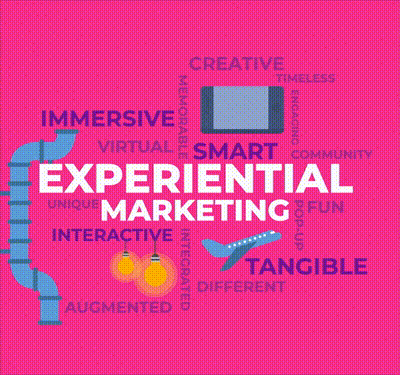
03 Jan How Experiential Marketing helps brands
Experiential marketing is a surefire way to build brand awareness and brand affinity, boost brand recognition, attract new customers, and have current customers come back for more. It is the perfect catalyst for word-of-mouth since people love sharing their positive customer experiences.It is defined as live events where audiences interact with products or brand face-to-face. Experiential marketing works. In addition to helping brands differentiate themselves in a crowded market, experiential marketing is a marketing tactic which aligns precisely with what consumers today desire: experiences. Data has revealed that consumers are 4x more likely to invest in experiences and that the value attributed to an ‘experience purchase’ increases over time.
Engagement marketing, sometimes called “experiential marketing”, “event marketing”, “on-ground marketing”, “live marketing”, “participation marketing”, or “special events” is a marketing strategy that directly engages consumers and invites and encourages them to participate in the evolution of a brand or a brand experience.
Engagement marketers believe that consumers should be actively involved in the production and co-creation of marketing programs and developing a relationship with the brand.
Consumer engagement is when a brand and a consumer connect. According to Brad Nierenberg, “Experiential marketing is the live, one-on-one interactions that allow consumers to create connections with brands. Consumers will continue to seek and demand one-on-one, shareable interaction with a brand.”
Experiential marketing is a growing trend which involves marketing a product or a service through experiences that engage the customers and create emotional attachment to the product or service. Physical and interactive experiences are used to reinforce the offer of a product and make customers feel as if they are part of them. Engagement measures the extent to which a consumer has a meaningful brand experience when exposed to commercial advertising, sponsorship, television contact, or other experience
Meanwhile, a report by The Event Marketing Institute and Mosaic found that 74% of consumers say that engaging with branded event marketing experiences makes them more likely to buy the products being promoted.
The philosophy of experiential marketing is that audiences should be engaged in the sales process when they want, and by which channels they prefer.
A great example of experiential marketing using immersive technology is done through a Sustainable Dance Floor activation for the Molson Red Leaf Project. People were inspired to dance on the illuminated Sustainable Floor, every step generated 24 watts of electricity.
Experiential marketing give freedom to use what seems to be a good idea, be innovative in terms of staging a good experiential marketing show or an event.
Traditional marketers looked at brand, as a static means of identifying a company’s logo and artwork. However, in experiential marketing brand is considered to be a source of experiences. Certainly, it goes without saying that experiential marketing involves all the five senses. Therefore, the scope of experiential marketing is very vast.
Experiential Marketing: Four Key Characteristics
It varies from the traditional marketing and concentrates on features and benefits through the major ways:
- Focus on Customer Experiences
- Examining the Consumption Situation
- Customers Are Rational and Emotional Animals
- Methods and Tools are Eclectic
The benefits of experiential marketing
- Provides an opportunity to directly communicate with customers.
- It is not perceived as traditional marketing by consumers.
- It provides real time insight into how consumers perceive and engage with the brand.
- Experiential programs sometimes build awareness for a new product.
- It can occur both online and offline.
- Drives word-of-mouth to a greater extent.
- Increases the reach organically
Experiential marketing should
- stimulate the active participation and engagement of the consumer.
- promote the brand values and messages.
- Generate long term value.
- Maintain communication with the audience
Experiential marketing which is quite different from traditional marketing provides an add on experience to the customers and helps them to feel, think, act, and relate to the brand. Definitely it provides brand identity but also essentially it provides experience. It gives a unique platform to permit consumers as an experience with a brand related to the concept of fun and entertainment.

